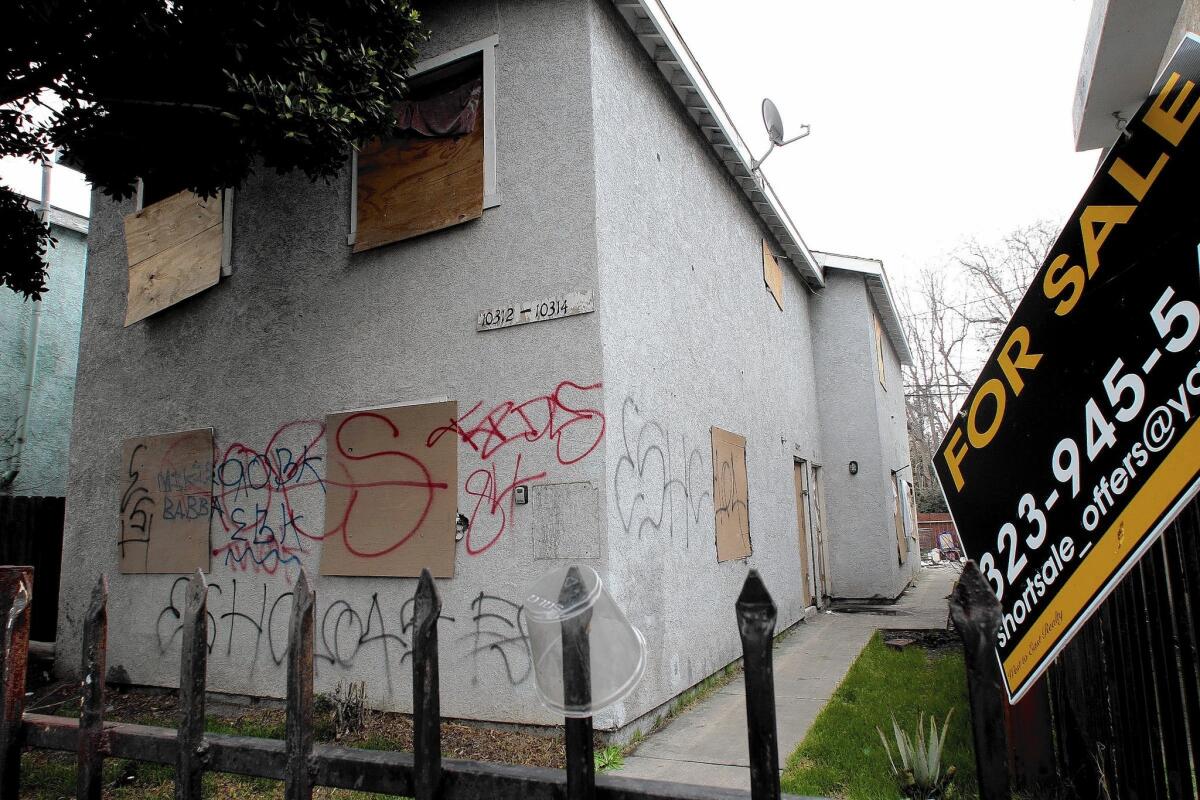Former BofA short-sales employee gets prison term for taking bribes

- Share via
A former Bank of America mortgage employee was sentenced to 30 months in prison for pocketing $1.2 million in payoffs to approve sales of distressed properties for far less than their actual value.
Kevin Lauricella, 29, who had worked for BofA in Simi Valley, was arrested on an indictment unsealed last October. He pleaded guilty in January to accepting bribes and falsifying bank records and had been cooperating with investigators.
------------
For the Record
July 25, 12:30 p.m.: An earlier version of this post was incorrectly accompanied by a thumbnail photo of a property listed by real estate agent Martha Gonzalez. Gonzalez is not involved with Kevin Lauricella or the short-sales investigation.
------------
He was sentenced Monday by U.S. District Judge Otis D. Wright II in Los Angeles. Wright also ordered Lauricella to repay Bank of America $5.7 million in losses and to forfeit a Thousand Oaks home acquired with spoils from the criminal scheme.
Lauricella worked in 2010 and early 2011 for a BofA division that handled delinquent home loans. At that time, lenders were overwhelmed by defaults on underwater mortgages, creating opportunities for insiders to exploit flaws in bank systems, said Asst. U.S. Atty. Ranee A. Katzenstein.
Plea agreements filed by three other defendants at the time of Lauricella’s arrest indicated that the manipulation of Southland home sales for illicit profit was widespread.
“It’s part of a large, ongoing investigation,” Katzenstein said. “There are a large number of related cases.”
The crimes involved short sales, which allow troubled borrowers to satisfy their mortgage debts by selling the property for less than they owed. That created a loss for the mortgage holder, but one that could be much less than the loss from a foreclosure -- assuming the sale is for the best possible price.
Lauricella collected bribes from so-called flippers who bought homes with the intent of quickly reselling them, Katzenstein said. He then issued approvals for short sales that were beyond his authority to approve, with sales prices far below the fair market value.
Lauricella made false entries in Bank of America’s computer system to make it appear that higher-ups had approved the short sales, Katzenstein said. When he pleaded guilty, Lauricella admitted approving fraudulent short sales for at least nine properties.
A Bank of America spokesman said that Lauricella was fired in 2011 and that the bank cooperated with the FBI investigation of the case.
Flippers involved in such schemes typically sell the homes to good-faith buyers, who often face what Katzenstein called a “litigation nightmare” over whether the sales are invalid, with mortgage lenders and title insurers trying to reclaim losses.
“The banks suffered losses, of course,” she said. “But a lot of other innocent parties suffer as well when it winds up the title is clouded on what they thought were their dream houses.”
Mortgages, fraud, bank news: follow @ScottReckard
More to Read
Inside the business of entertainment
The Wide Shot brings you news, analysis and insights on everything from streaming wars to production — and what it all means for the future.
You may occasionally receive promotional content from the Los Angeles Times.










